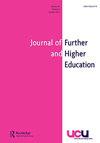‘If lecturers are at home, they can’t tell their kids to shut up’: university student engagement with blended learning during Covid-19: a mixed methods study
IF 2.3
Q1 EDUCATION & EDUCATIONAL RESEARCH
引用次数: 2
Abstract
ABSTRACT Covid-19 had an unprecedented impact on daily living and resulted in many restrictions across all areas of life. Consequently, educational establishments in the UK adapted teaching delivery by moving to online or blended learning during the main ‘stay at home’ phase and many remained online as ongoing restrictions were announced. Many changes made during this period such as a move to online learning are likely to remain, in some capacity, as we emerge from the pandemic. The aim of this study was to explore student engagement with online and blended learning in a Higher Education (HE) institution using a mixed methods approach. One hundred and eighty-two HE sport students completed an online survey and a total of twenty one HE students took part in a series of online focus groups to gain a unique insight into how the move to online learning affected engagement from the student perspective. The findings indicated that although most students engaged with the online materials, many had a perceived negative experience. Students in general would not recommend online delivery to others and an overwhelming majority felt disadvantaged in terms of motivation and lack of community by moving to online learning. There was some positive feedback around the use of some technological tools to facilitate answering questions as well as use of online lectures for delivering content driven sessions. Our results clearly demonstrate that that a one size fits all approach is not appropriate when it comes to online learning.“如果讲师在家,他们不能告诉孩子闭嘴”:新冠肺炎期间大学生参与混合学习:一项混合方法研究
摘要新冠肺炎对日常生活产生了前所未有的影响,并在生活的各个领域造成了许多限制。因此,英国的教育机构在主要的“待在家里”阶段通过转向在线或混合学习来调整教学方式,随着持续的限制措施的宣布,许多教育机构仍保持在线。随着我们摆脱疫情,在此期间做出的许多改变,如转向在线学习,可能会在一定程度上保持不变。本研究的目的是探索学生在高等教育(HE)机构中使用混合方法进行在线和混合学习的参与度。182名高等教育体育学生完成了一项在线调查,共有21名高等教育学生参加了一系列在线焦点小组,以从学生的角度独特地了解转向在线学习如何影响参与度。研究结果表明,尽管大多数学生都参与了在线材料,但许多学生都有负面体验。一般来说,学生不会向他人推荐在线学习,绝大多数学生认为,通过转向在线学习,在动机和缺乏社区方面处于不利地位。关于使用一些技术工具来方便回答问题以及使用在线讲座来提供内容驱动的课程,有一些积极的反馈。我们的研究结果清楚地表明,在在线学习方面,一刀切的方法是不合适的。
本文章由计算机程序翻译,如有差异,请以英文原文为准。
求助全文
约1分钟内获得全文
求助全文
来源期刊

JOURNAL OF FURTHER AND HIGHER EDUCATION
EDUCATION & EDUCATIONAL RESEARCH-
CiteScore
5.20
自引率
4.30%
发文量
80
期刊介绍:
Journal of Further and Higher Education is an international, peer-reviewed journal publishing scholarly work that represents the whole field of post-16 education and training. The journal engages with a diverse range of topics within the field including management and administration, teacher education and training, curriculum, staff and institutional development, and teaching and learning strategies and processes. Through encouraging engagement with and around policy, contemporary pedagogic issues and professional concerns within different educational systems around the globe, Journal of Further and Higher Education is committed to promoting excellence by providing a forum for scholarly debate and evaluation. Articles that are accepted for publication probe and offer original insights in an accessible, succinct style, and debate and critique practice, research, theory. They offer informed perspectives on contextual and professional matters and critically examine the relationship between theory and practice across the spectrum of further and higher education.
 求助内容:
求助内容: 应助结果提醒方式:
应助结果提醒方式:


